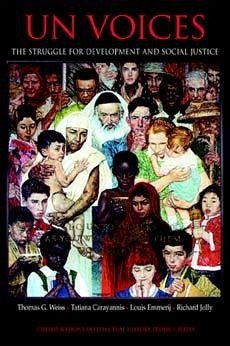Thomas G Weiss, Tatiana Carayannis, Louis Emmerij, Richard Jolly
Un Voices
The Struggle for Development and Social Justice
Schade – dieser Artikel ist leider ausverkauft. Sobald wir wissen, ob und wann der Artikel wieder verfügbar ist, informieren wir Sie an dieser Stelle.
Thomas G Weiss, Tatiana Carayannis, Louis Emmerij, Richard Jolly
Un Voices
The Struggle for Development and Social Justice
- Broschiertes Buch
- Merkliste
- Auf die Merkliste
- Bewerten Bewerten
- Teilen
- Produkt teilen
- Produkterinnerung
- Produkterinnerung
Kofi Annan, Boutros Boutros-Ghali, and 71 other UN professionals speak about international cooperation and the ideas that have shaped the accomplishments of the UN.
Andere Kunden interessierten sich auch für
![Concealed Silences and Inaudible Voices in Political Thinking Concealed Silences and Inaudible Voices in Political Thinking]() Michael FreedenConcealed Silences and Inaudible Voices in Political Thinking143,99 €
Michael FreedenConcealed Silences and Inaudible Voices in Political Thinking143,99 €![Exits, Voices and Social Investment Exits, Voices and Social Investment]() Keith DowdingExits, Voices and Social Investment22,99 €
Keith DowdingExits, Voices and Social Investment22,99 €![Voices of Reason Voices of Reason]() Bill EntzmingerVoices of Reason15,99 €
Bill EntzmingerVoices of Reason15,99 €![Voices of Freedom Voices of Freedom]() Mark DennisVoices of Freedom115,99 €
Mark DennisVoices of Freedom115,99 €![Nominated Member of Parliament Scheme, The: Are Unelected Voices Still Necessary in Parliament? - A Collection of Perspectives and Personal Reflections by Nmps Nominated Member of Parliament Scheme, The: Are Unelected Voices Still Necessary in Parliament? - A Collection of Perspectives and Personal Reflections by Nmps]() Nominated Member of Parliament Scheme, The: Are Unelected Voices Still Necessary in Parliament? - A Collection of Perspectives and Personal Reflections by Nmps73,99 €
Nominated Member of Parliament Scheme, The: Are Unelected Voices Still Necessary in Parliament? - A Collection of Perspectives and Personal Reflections by Nmps73,99 €![Voices of Reason Voices of Reason]() Bill EntzmingerVoices of Reason23,99 €
Bill EntzmingerVoices of Reason23,99 €![Voices for Freedom Voices for Freedom]() AnonymousVoices for Freedom29,99 €
AnonymousVoices for Freedom29,99 €
Kofi Annan, Boutros Boutros-Ghali, and 71 other UN professionals speak about international cooperation and the ideas that have shaped the accomplishments of the UN.
Produktdetails
- Produktdetails
- Verlag: Indiana University Press
- Seitenzahl: 544
- Erscheinungstermin: 17. Juni 2005
- Englisch
- Abmessung: 234mm x 157mm x 30mm
- Gewicht: 753g
- ISBN-13: 9780253217882
- ISBN-10: 0253217881
- Artikelnr.: 21742825
- Herstellerkennzeichnung
- Libri GmbH
- Europaallee 1
- 36244 Bad Hersfeld
- gpsr@libri.de
- Verlag: Indiana University Press
- Seitenzahl: 544
- Erscheinungstermin: 17. Juni 2005
- Englisch
- Abmessung: 234mm x 157mm x 30mm
- Gewicht: 753g
- ISBN-13: 9780253217882
- ISBN-10: 0253217881
- Artikelnr.: 21742825
- Herstellerkennzeichnung
- Libri GmbH
- Europaallee 1
- 36244 Bad Hersfeld
- gpsr@libri.de
Thomas G. Weiss is Presidential Professor of Political Science at The CUNY Graduate Center and Director of its Ralph Bunche Institute for International Studies. Tatiana Carayannis is Research Manager of the United Nations Intellectual History Project. Louis Emmerij is Senior Research Fellow at The CUNY Graduate Center's Ralph Bunche Institute for International Studies. Richard Jolly is Senior Research Fellow at The CUNY Graduate Center's Ralph Bunche Institute for International Studies and Professor Emeritus at the University of Sussex.
Contents Foreword Acknowledgments List of Abbreviations Introduction Part One. Individuals Make a Difference 1. Growing Up The Great Depression and the Demise of the League of Nations
World War II
Faith and Family Matters 2. Formal Education Education at Home
Studying Abroad 3. Serendipity and International Careers Mentors Opening Doors
Advanced Studies as a Gateway
Post-University Homecomings
Starting Out in Teaching and Research
Beginning in National Public Service
Juggling Family and Professional Life Part Two. Hope, Creativity, and Frustration 4. From 1945 through the 1950s: Hope Held High The Establishment of the United Nations
The Universal Declaration of Human Rights
The Marshall Plan
The Cold War
McCarthyism
Decolonization and the Non-Aligned Movement
The UN Regional Commissions 5. The 1960s: Widening Development Avenues The First Development Decade
UNCTAD and the Group of 77
Technical Cooperation: The Road to the UNDP
Influence of the Major Powers 6. The 1970s: Creativity Confronts Geopolitics The Environment and Sustainability
Oil Shocks and the NIEO
Transnational Corporations
The Least Developed Countries
Basic Needs and Redistribution
Women and Gender 7. The 1980s: Development Frustrated Death of the North-South "Dialogue"
The Debt Crisis and Adjustment: A Lost Decade
The Washington "Consensus"
The End of the Cold War and the Socialist Model 8. The 1990s and the Dawn of the Twenty-First Century: Renaissance and Reform? Globalization
Human Development
Human Security and the Responsibility to Protect
Global Governance and the Millennium Development Goals Part Three. The World Organization, Ideas, and Twenty-First-Century Challenges 9. A Revolutionary Idea: The International Civil Service Good Old Days?
Cold War Diversions
Geographical Representation
Women at the UN
Organizational Culture
Reform Difficulties 10. The Power of Ideas and People inside the UN Leadership
The Secretaries-General
Tensions in the System
Country Groups and International Negotiations 11. Blending Outside Intellectual Energies Outside Academics and Consultants
Independent Commissions of Eminent Persons
Nongovernmental Organizations and the Private Sector
Global Conferences 12. The Legacy and Future Intellectual Challenges Ideas Change International Discourse
Ideas Redefine State and Nonstate Interests and Goals
Ideas Facilitate New Coalitions
Ideas Become Embedded in Institutions
The UN's Future Intellectual Challenges Annex 1. Biographical Notes of Persons Interviewed Annex 2. A Methodological Note: Making This Oral History Notes Index of Persons Interviewed Index of Subjects About the Authors About the United Nations Intellectual History Project
World War II
Faith and Family Matters 2. Formal Education Education at Home
Studying Abroad 3. Serendipity and International Careers Mentors Opening Doors
Advanced Studies as a Gateway
Post-University Homecomings
Starting Out in Teaching and Research
Beginning in National Public Service
Juggling Family and Professional Life Part Two. Hope, Creativity, and Frustration 4. From 1945 through the 1950s: Hope Held High The Establishment of the United Nations
The Universal Declaration of Human Rights
The Marshall Plan
The Cold War
McCarthyism
Decolonization and the Non-Aligned Movement
The UN Regional Commissions 5. The 1960s: Widening Development Avenues The First Development Decade
UNCTAD and the Group of 77
Technical Cooperation: The Road to the UNDP
Influence of the Major Powers 6. The 1970s: Creativity Confronts Geopolitics The Environment and Sustainability
Oil Shocks and the NIEO
Transnational Corporations
The Least Developed Countries
Basic Needs and Redistribution
Women and Gender 7. The 1980s: Development Frustrated Death of the North-South "Dialogue"
The Debt Crisis and Adjustment: A Lost Decade
The Washington "Consensus"
The End of the Cold War and the Socialist Model 8. The 1990s and the Dawn of the Twenty-First Century: Renaissance and Reform? Globalization
Human Development
Human Security and the Responsibility to Protect
Global Governance and the Millennium Development Goals Part Three. The World Organization, Ideas, and Twenty-First-Century Challenges 9. A Revolutionary Idea: The International Civil Service Good Old Days?
Cold War Diversions
Geographical Representation
Women at the UN
Organizational Culture
Reform Difficulties 10. The Power of Ideas and People inside the UN Leadership
The Secretaries-General
Tensions in the System
Country Groups and International Negotiations 11. Blending Outside Intellectual Energies Outside Academics and Consultants
Independent Commissions of Eminent Persons
Nongovernmental Organizations and the Private Sector
Global Conferences 12. The Legacy and Future Intellectual Challenges Ideas Change International Discourse
Ideas Redefine State and Nonstate Interests and Goals
Ideas Facilitate New Coalitions
Ideas Become Embedded in Institutions
The UN's Future Intellectual Challenges Annex 1. Biographical Notes of Persons Interviewed Annex 2. A Methodological Note: Making This Oral History Notes Index of Persons Interviewed Index of Subjects About the Authors About the United Nations Intellectual History Project
Contents Foreword Acknowledgments List of Abbreviations Introduction Part One. Individuals Make a Difference 1. Growing Up The Great Depression and the Demise of the League of Nations
World War II
Faith and Family Matters 2. Formal Education Education at Home
Studying Abroad 3. Serendipity and International Careers Mentors Opening Doors
Advanced Studies as a Gateway
Post-University Homecomings
Starting Out in Teaching and Research
Beginning in National Public Service
Juggling Family and Professional Life Part Two. Hope, Creativity, and Frustration 4. From 1945 through the 1950s: Hope Held High The Establishment of the United Nations
The Universal Declaration of Human Rights
The Marshall Plan
The Cold War
McCarthyism
Decolonization and the Non-Aligned Movement
The UN Regional Commissions 5. The 1960s: Widening Development Avenues The First Development Decade
UNCTAD and the Group of 77
Technical Cooperation: The Road to the UNDP
Influence of the Major Powers 6. The 1970s: Creativity Confronts Geopolitics The Environment and Sustainability
Oil Shocks and the NIEO
Transnational Corporations
The Least Developed Countries
Basic Needs and Redistribution
Women and Gender 7. The 1980s: Development Frustrated Death of the North-South "Dialogue"
The Debt Crisis and Adjustment: A Lost Decade
The Washington "Consensus"
The End of the Cold War and the Socialist Model 8. The 1990s and the Dawn of the Twenty-First Century: Renaissance and Reform? Globalization
Human Development
Human Security and the Responsibility to Protect
Global Governance and the Millennium Development Goals Part Three. The World Organization, Ideas, and Twenty-First-Century Challenges 9. A Revolutionary Idea: The International Civil Service Good Old Days?
Cold War Diversions
Geographical Representation
Women at the UN
Organizational Culture
Reform Difficulties 10. The Power of Ideas and People inside the UN Leadership
The Secretaries-General
Tensions in the System
Country Groups and International Negotiations 11. Blending Outside Intellectual Energies Outside Academics and Consultants
Independent Commissions of Eminent Persons
Nongovernmental Organizations and the Private Sector
Global Conferences 12. The Legacy and Future Intellectual Challenges Ideas Change International Discourse
Ideas Redefine State and Nonstate Interests and Goals
Ideas Facilitate New Coalitions
Ideas Become Embedded in Institutions
The UN's Future Intellectual Challenges Annex 1. Biographical Notes of Persons Interviewed Annex 2. A Methodological Note: Making This Oral History Notes Index of Persons Interviewed Index of Subjects About the Authors About the United Nations Intellectual History Project
World War II
Faith and Family Matters 2. Formal Education Education at Home
Studying Abroad 3. Serendipity and International Careers Mentors Opening Doors
Advanced Studies as a Gateway
Post-University Homecomings
Starting Out in Teaching and Research
Beginning in National Public Service
Juggling Family and Professional Life Part Two. Hope, Creativity, and Frustration 4. From 1945 through the 1950s: Hope Held High The Establishment of the United Nations
The Universal Declaration of Human Rights
The Marshall Plan
The Cold War
McCarthyism
Decolonization and the Non-Aligned Movement
The UN Regional Commissions 5. The 1960s: Widening Development Avenues The First Development Decade
UNCTAD and the Group of 77
Technical Cooperation: The Road to the UNDP
Influence of the Major Powers 6. The 1970s: Creativity Confronts Geopolitics The Environment and Sustainability
Oil Shocks and the NIEO
Transnational Corporations
The Least Developed Countries
Basic Needs and Redistribution
Women and Gender 7. The 1980s: Development Frustrated Death of the North-South "Dialogue"
The Debt Crisis and Adjustment: A Lost Decade
The Washington "Consensus"
The End of the Cold War and the Socialist Model 8. The 1990s and the Dawn of the Twenty-First Century: Renaissance and Reform? Globalization
Human Development
Human Security and the Responsibility to Protect
Global Governance and the Millennium Development Goals Part Three. The World Organization, Ideas, and Twenty-First-Century Challenges 9. A Revolutionary Idea: The International Civil Service Good Old Days?
Cold War Diversions
Geographical Representation
Women at the UN
Organizational Culture
Reform Difficulties 10. The Power of Ideas and People inside the UN Leadership
The Secretaries-General
Tensions in the System
Country Groups and International Negotiations 11. Blending Outside Intellectual Energies Outside Academics and Consultants
Independent Commissions of Eminent Persons
Nongovernmental Organizations and the Private Sector
Global Conferences 12. The Legacy and Future Intellectual Challenges Ideas Change International Discourse
Ideas Redefine State and Nonstate Interests and Goals
Ideas Facilitate New Coalitions
Ideas Become Embedded in Institutions
The UN's Future Intellectual Challenges Annex 1. Biographical Notes of Persons Interviewed Annex 2. A Methodological Note: Making This Oral History Notes Index of Persons Interviewed Index of Subjects About the Authors About the United Nations Intellectual History Project








